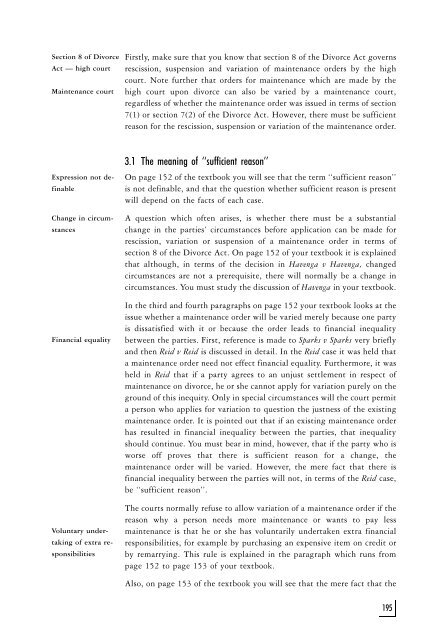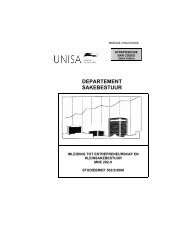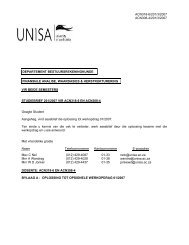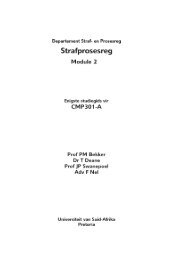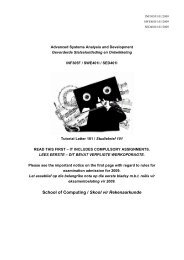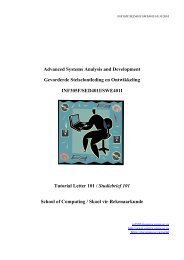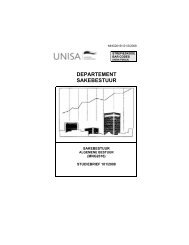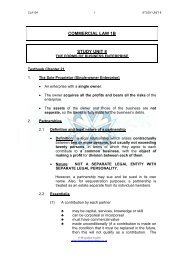key to the study guide - Name
key to the study guide - Name
key to the study guide - Name
You also want an ePaper? Increase the reach of your titles
YUMPU automatically turns print PDFs into web optimized ePapers that Google loves.
Section 8 of Divorce<br />
Act Ð high court<br />
Maintenance court<br />
Expression not definable<br />
Change in circumstances<br />
Financial equality<br />
Voluntary undertaking<br />
of extra responsibilities<br />
Firstly, make sure that you know that section 8 of <strong>the</strong> Divorce Act governs<br />
rescission, suspension and variation of maintenance orders by <strong>the</strong> high<br />
court. Note fur<strong>the</strong>r that orders for maintenance which are made by <strong>the</strong><br />
high court upon divorce can also be varied by a maintenance court,<br />
regardless of whe<strong>the</strong>r <strong>the</strong> maintenance order was issued in terms of section<br />
7(1) or section 7(2) of <strong>the</strong> Divorce Act. However, <strong>the</strong>re must be sufficient<br />
reason for <strong>the</strong> rescission, suspension or variation of <strong>the</strong> maintenance order.<br />
3.1 The meaning of ``sufficient reason''<br />
On page 152 of <strong>the</strong> textbook you will see that <strong>the</strong> term ``sufficient reason''<br />
is not definable, and that <strong>the</strong> question whe<strong>the</strong>r sufficient reason is present<br />
will depend on <strong>the</strong> facts of each case.<br />
A question which often arises, is whe<strong>the</strong>r <strong>the</strong>re must be a substantial<br />
change in <strong>the</strong> parties' circumstances before application can be made for<br />
rescission, variation or suspension of a maintenance order in terms of<br />
section 8 of <strong>the</strong> Divorce Act. On page 152 of your textbook it is explained<br />
that although, in terms of <strong>the</strong> decision in Havenga v Havenga, changed<br />
circumstances are not a prerequisite, <strong>the</strong>re will normally be a change in<br />
circumstances. You must <strong>study</strong> <strong>the</strong> discussion of Havenga in your textbook.<br />
In <strong>the</strong> third and fourth paragraphs on page 152 your textbook looks at <strong>the</strong><br />
issue whe<strong>the</strong>r a maintenance order will be varied merely because one party<br />
is dissatisfied with it or because <strong>the</strong> order leads <strong>to</strong> financial inequality<br />
between <strong>the</strong> parties. First, reference is made <strong>to</strong> Sparks v Sparks very briefly<br />
and <strong>the</strong>n Reid v Reid is discussed in detail. In <strong>the</strong> Reid case it was held that<br />
a maintenance order need not effect financial equality. Fur<strong>the</strong>rmore, it was<br />
held in Reid that if a party agrees <strong>to</strong> an unjust settlement in respect of<br />
maintenance on divorce, he or she cannot apply for variation purely on <strong>the</strong><br />
ground of this inequity. Only in special circumstances will <strong>the</strong> court permit<br />
a person who applies for variation <strong>to</strong> question <strong>the</strong> justness of <strong>the</strong> existing<br />
maintenance order. It is pointed out that if an existing maintenance order<br />
has resulted in financial inequality between <strong>the</strong> parties, that inequality<br />
should continue. You must bear in mind, however, that if <strong>the</strong> party who is<br />
worse off proves that <strong>the</strong>re is sufficient reason for a change, <strong>the</strong><br />
maintenance order will be varied. However, <strong>the</strong> mere fact that <strong>the</strong>re is<br />
financial inequality between <strong>the</strong> parties will not, in terms of <strong>the</strong> Reid case,<br />
be ``sufficient reason''.<br />
The courts normally refuse <strong>to</strong> allow variation of a maintenance order if <strong>the</strong><br />
reason why a person needs more maintenance or wants <strong>to</strong> pay less<br />
maintenance is that he or she has voluntarily undertaken extra financial<br />
responsibilities, for example by purchasing an expensive item on credit or<br />
by remarrying. This rule is explained in <strong>the</strong> paragraph which runs from<br />
page 152 <strong>to</strong> page 153 of your textbook.<br />
Also, on page 153 of <strong>the</strong> textbook you will see that <strong>the</strong> mere fact that <strong>the</strong><br />
195


